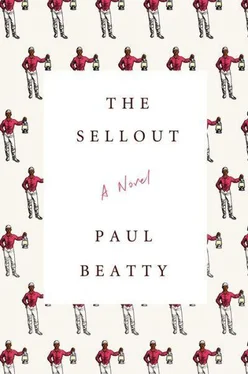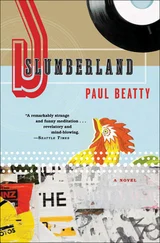But even in sunny California you can’t grow watermelon year-round. The winter nights are colder than people think. Twenty-pound melons take forever to mature, and they suck nitrate out of the soil like it’s sodium crack. So it’s the marijuana that’s my mainstay. I rarely sell it. Weed isn’t a cash crop, but more like a gas money one, plus I don’t want motherfuckers running up on me in the middle of the night. Occasionally, I’ll pull out an eighth, and the unsuspecting homie who’s been weaned on the Chronic, and who now lies on my front lawn covered in dirt and grass, laughing his ass off, his legs entwined in the frame of the bicycle he’s forgotten how to ride, will proudly hold up the joint he never dropped and ask me, “What this shit called?”
“Ataxia,” I’ll say.
On the house party dance floor, when La Giggles, whom I’ve known since second grade, finally stops staring incessantly into her compact mirror at a face she likes but doesn’t quite recognize, she turns to me and asks three questions. Who am I? And who this nigger sticking his tongue in my ear grinding on my ass? And what the fuck am I smoking? The answers to her questions are: Bridget “La Giggles” Sanchez, your husband, and Prostopagnosia. Sometimes folks wonder why I always have the kine bud. But any suspicious curiosity can be allayed with a shrug of the shoulders and a deadpan “Oh, I know some white boys…”
Light up a joint. Exhale. Weed that smells bad is good. And a dank, wispy cloud of smoke that smells like red tide at Huntington Beach, dead fish, and seagulls roasting in the hot sun will make a woman stop twirling her baby. Offer her a hit, sloppy-end first. She’ll nod. It’s Anglophobia, a strain that I’ve just developed, but she doesn’t need to know that. Anything that will allow me to come closer is a good thing. Approach in peace, and climb the ivy-covered latticework or stand on some big nigger’s shoulders and put myself within arms’ reach, so that I can touch her. Stroke her with techniques that are basically the same ones I used on the thoroughbreds at school after a work-study day of galloping and breezing horses in the fields. Rub her ears. Blow gently into her nostrils. Work her joints. Brush her hair. Shotgun weed smoke into her pursed and needy lips. When she hands me the baby, and I descend the stairs into the applause of the waiting crowd, I’d like to think that Gregor Mendel, George Washington Carver, and even my father would be proud, and sometime while they’re being strapped to the gurney or consoled by a distraught grandmother, I’ll ask them, “Why Wednesday?”
Dickens’s evanesce hit some folks harder than others, but the citizen who needed my services the most was old man Hominy Jenkins. Hominy had always been a little unstable, but my father never really dealt with him. I don’t think he thought losing a gray-haired relic to Uncle Toms past would be any great loss to the neighborhood, so it’d be up to me to “go get that fool nigger.” I guess, in a sense, Hominy was my first nigger whisperee. I can’t count how many times I had to wrap a blanket around him because he was trying to commit suicide-by-gangbanger by wearing red in the blue neighborhoods, blue in the red, or shouting, “ ¡Yo soy el gran pinche mayate! ¡Julio César Chávez es un puto! ” in the brown. He used to climb palm trees and recite Tarzan lines to the natives, “Me Tarzan, you Shaniqua!” And I’d have to beg every woman in the neighborhood to lower her gun and coax Hominy down with a phony contract from a long-dead movie studio, front-loaded with beer and smokehouse almond signing bonuses. One Halloween he yanked the doorbell wires from his living room wall and attached them to his testes, so when the trick-or-treaters rang the buzzer, instead of candy and an autographed photo, they got blood-curdling screams that continued until I fought my way through the sadistic throng of fairy godmothers and superheroes and pulled She-Hulk’s green eight-year-old finger away from the ringer long enough for me to talk Hominy into pulling his pants up and the shades down.
As the supposed Murder Capital of the World, Dickens never got much tourist trade. Occasionally, a pack of college kids vacationing in Los Angeles for the first time would stop at a busy intersection just long enough to shoot twenty seconds of shaky handheld video of them jumping up and down, whooping like crazed savages, shouting, “Check us out! We’re in Dickens, California. What you know about that, fool?” then post the footage of their urban safari on the Internet. But when all the WELCOME TO DICKENS signs were removed, there was no Blarney Stone to kiss, the urban voyeurs stopped coming. Sometimes genuine sightseers did come through. Mostly old and pensioned, they’d troll the streets in their out-of-state license-plated RVs looking for the last link to their youths. Those halcyon days the campaign politicians always promise to take us back to when America was powerful and respected, a land of morals and virtue and cheap gas. And asking a local, “Excuse me, do you know where I can find Hominy?” was like asking some penny-ante lounge singer if they knew the way to San Jose.
Hominy Jenkins is the last surviving member of the Little Rascals, that madcap posse of street urchins who, from the Roaring Twenties until the Reaganomics eighties, flummoxed potbellied coppers, ditching school seven days a week and twice on Sundays on matinee movie screens and after-school televisions around the world. Signed by Hal Roach Studios in the mid-1930s at a reputed $350 a week to be Buckwheat Thomas’s understudy, Hominy cashed his checks and bided his time by playing minor roles: the silent little brother who had to be babysat while Mother was away visiting Papa in jail, the colored kid on the ass-end of the runaway mule. He made do delivering the occasional throwaway one-liner from the back of the one-room schoolhouse. Acknowledging talking babies, wild men from Borneo, and Alfalfa’s soap-bubble solos with an exaggerated roll of the eyeballs and his trademark “Yowza!” The underutilization of his sooty black cuteness made bearable with the knowledge that one day soon he’d step into the oversized, curly-toed genie shoes of the great pickaninnies that preceded him. Take his rightful place in the wisecracking pantheon of Farina, Stymie, and Buckwheat, and carry the legacy of bowler-hatted, ragamuffin racism well into the 1950s. But the era of the human golliwog and the one-reeler died before his turn came. Hollywood had all the blackness it needed in the demi-whiteness of Harry Belafonte and Sidney Poitier, the brooding Negritude of James Dean, and the broad, gravity-defying, Venus hot-to-trot roundness of Marilyn Monroe’s ass.
When they found his house, Hominy would greet his devotees with a wide Polident smile and an arthritic finger-wiggling high sign. Inviting them in for Hi-C Fruit Punch and, if they were lucky, slices of my watermelon. I doubt that he told his aging fan base the same stories he shared with us. It’s hard to say what started the love affair between me and Marpessa Delissa Dawson. She’s three years older than me and I’ve known her all my life. A lifelong resident of the Farms, her mother ran the Sun to Sun Equestrian and Polo School from their backyard. They used to call me whenever they were short a show jumper or a Number 4 on the Junior Spearchukkers. I wasn’t much good at either, because Appaloosas are shitty jumpers and using your left hand is illegal in polo. When we were younger, me, Marpessa, and the rest of the kids on the block would jet over to Hominy’s house after school, because what could be cooler than watching an hour of Little Rascals with a Little Rascal? In those days, when remote control television was your father screaming, “Shawn! Don! Mark! One of you motherfuckers come downstairs and change this goddamn channel,” fine-tuning a fickle ultra-high-frequency station like Channel 52, KBSC-TV Corona, Los Angeles, on a beat-up black-and-white portable missing one rabbit ear antenna and all its dials required a vascular surgeon’s touch. It took forever to finagle a set of plumbing pliers around the stubby metal knobs, looking for any angularity that might result in the weest bit of channel-changing torque or vertical and horizontal hold. But when the opening title sequence, accompanied by the drunken warbling horns in the Our Gang theme song, popped up on the TV, we’d settle in around gray-haired Hominy and those red-hot space heater coils like slave children gathered ’round ol’ Remus and his fire.
Читать дальше












